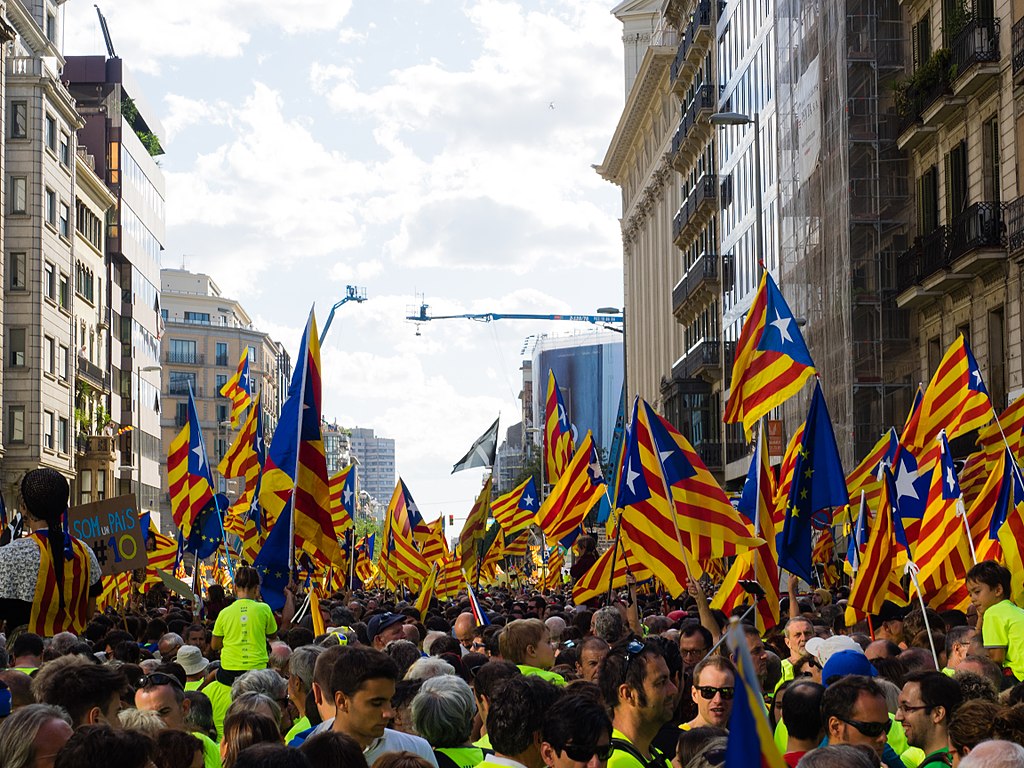The Catalan elections of 21 December take place in exceptional conditions of repression and limitation of democratic rights. The elections have become a battleground to legitimise (or not) a coup by the 1978 regime, in which article 155 of the Spanish constitution was used to dismiss the Catalan government and disband the Catalan parliament. With two days to go, the result of the elections is hard to predict.
The conditions of repression under which these elections take place can be traced back to the moment and manner in which they were called. On 27 October, the Catalan parliament, after much hesitation on the part of the Catalan government coalition, finally decided to proclaim a Catalan Republic, following up on the mandate of the 1 October independence referendum. The Spanish government used powers granted to it by the Senate under article 155 of the constitution to intervene against Catalan autonomic powers, dismiss the Catalan government and disband parliament. This was followed by the indictment of all Catalan government members on charges of rebellion and sedition, which have no legal grounds. On the basis of these charges, several Catalan government members were remanded in custody pending trial and denied bail. Others fled to Belgium and will be arrested as soon as they return.
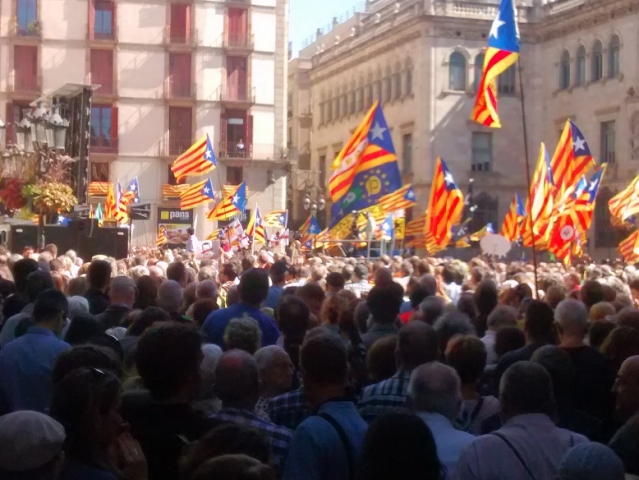 Catalan independence protest 2017 / Image: fair use
Catalan independence protest 2017 / Image: fair use
This also means that a number of high profile candidates in these elections are either in jail or in exile. The presidential candidate for Junts per Catalunya (United for Catalonia, the list created by centre-right nationalist PDECAT) is Catalan president Carles Puigdemont who is currently in Belgium and cannot participate in the campaign freely. In fact, the Spanish state withdrew the euro-arrest order against him when it realised that the Belgian judiciary might not concede it for all counts requested. This means that, while Puigdemont is not subject to being forcefully sent back to Spain, he would be arrested the minute he set foot on Spanish soil. The number two in the Junts per Catalunya list (JuntsxCat) is Jordi Sánchez, the former leader of the Catalan National Assembly, who is remanded in custody in a Spanish jail, indicted for ‘sedition’ for his role in the mass demonstration against Spanish police searches and arrests on 20 September. He has been subject to further curtailment of his visitation and communication rights and transferred to a different wing of the prison as a punishment for having sent out an audio message, which was read at an election rally.
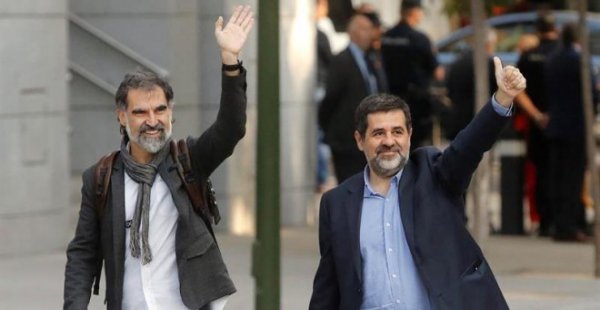 Jordi Sánchez and Jordi Cuixart / Image: fair use
Jordi Sánchez and Jordi Cuixart / Image: fair use
The presidential candidate for the social democratic Catalan nationalist party, ERC, is Catalan vice-president Oriol Junqueras, who has also been in jail for over a month-and-a-half, and was remanded in custody without bail. He has now been subject to further limitation of his rights for conducting a radio interview by phone.
During the campaign itself, the judge in charge of the trial for the 1 October referendum and subsequent declaration of a Republic, has ordered the police to carry out further inquiries which could lead to the indictment of dozens of other people on charges of rebellion, sedition and conspiracy to commit those. The judge specifically ordered the police to gather evidence about the Committees for the Defence of the Republic and their leaders. Unusually the judge’s instructions were made public and given widespread publicity by the tribunal itself. The aim was clear: send out a signal that repression was not easing but rather that others would be subject to it.
In Reus dozens of people have been indicted for ‘hate crimes’ as a result of a police complaint arising from the mass demonstrations against police presence in the town in the lead up to the independence referendum. Those indicted are local councillors and members of the local government who signed a public statement complaining about the conduct of police, fire fighters who participated in the demonstrations and a number of local activists who allegedly played a role in organising them. This case is particularly scandalous as legislation passed to prosecute hate crimes against vulnerable or oppressed groups is being used to prosecute people exercising their democratic right to march and protest at the provocative attitude of the police.
The Electoral Juntas (Catalan and provincial ones) have ruled against members of polling stations wearing yellow ribbons which have become the symbol of the struggle to free Catalan political prisoners. The accumulation of petty acts of repression has reached absurd levels. The Barcelona council was banned from using yellow lighting in public fountains and buildings as had been agreed. Local councils have been forced to take down ‘Free Political Prisoners’ banners from the town hall balconies.
Last week Catalan police officers were instructed to inspect the buildings of Catalan government departments and report on any banners, signs or yellow ribbons. In one such building in Girona they demanded yellow ribbons be removed from a Christmas tree!
It is no surprise therefore that these elections represent a test of the legitimacy of the coup. The extreme political polarisation they have created will also produce a very high turnout, probably above 80 percent: five percentage points above that of the previous election in 2015, which at that time was already a record high.
The 155 block
The three parties that fully supported the application of article: the ruling Popular Party (PP), its allies Ciudadanos (Cs) and the Socialist Party (PSC) aim to get a majority for the ‘constitutional block’ to bury once and for all any attempt to move towards an independence referendum and demonstrate that their decision to smash the Catalan institutions has the support of a majority of Catalans.
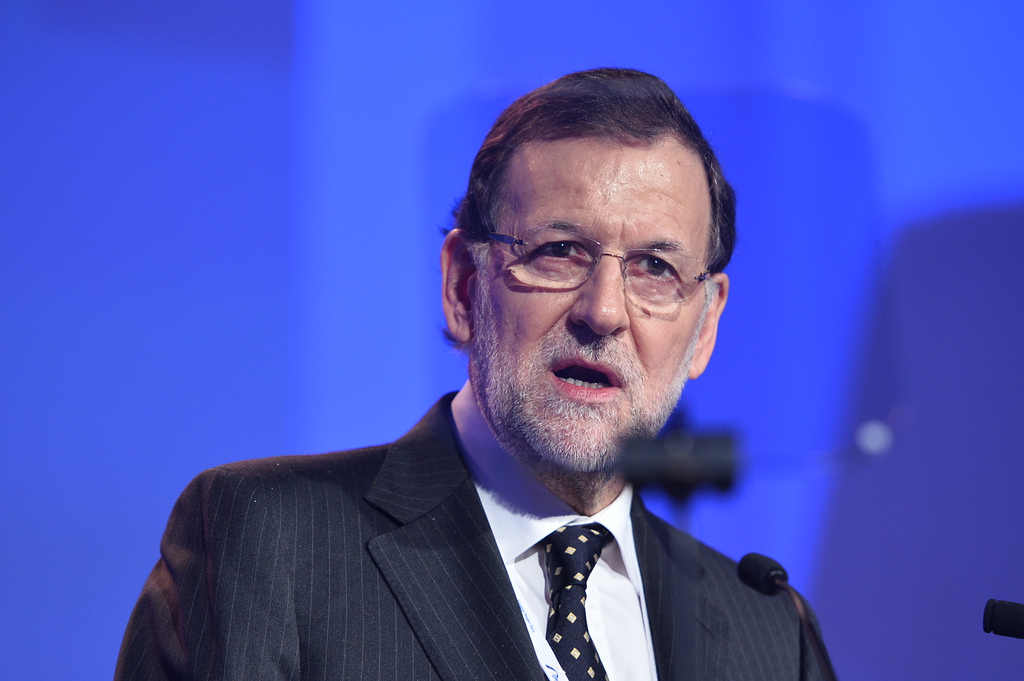 Mariano Rajoy / Image: Flickr, EPP
Mariano Rajoy / Image: Flickr, EPP
The Spanish vice-president and PP leader Soraya Saenz de Santamaria boasted that it was “thanks to Mariano Rajoy” that ERC and JuntsxCat had no leaders as “they have been beheaded”. A leader of the PSC, Josep Borrell, talked about the necessary “reconciliation” after December 21, but added that this would require “disinfection” in several places, including the Catalan media. This is the provocative, vengeful language with which the 155 block parties are conducting their campaign. Implicit in the threats issued by leaders of the PP is the idea that, if the pro-independence parties win a majority in the Catalan parliament again, article 155 intervention will not be lifted. As it could not be otherwise, such a campaign benefits the party which appears as the most radical, uncompromising Spanish nationalists of all of them: Ciudadanos, which the opinion polls predict will get between 20 and 24 percent of the votes and is neck-and-neck with ERC for the first position.
The Socialist Party (PSC) has conducted a campaign looking to capture both the Spanish nationalist vote and the moderate Catalan nationalist vote, which might no longer feel represented by JuntsxCat. It has included in its lists six prominent members of Unió: the right wing Catalan nationalist party that opposes independence and counts on the support of wide sections of the Catalan ruling class, whono longer trust JuntsxCat as their political representative. It is forecasted to somewhat recover from its historic low point of 12 percent at the previous election in 2015, and is now polling around 15 percent.
The Popular Party has lost a significant section of its votes to Ciudadanos and is likely to come last and may not even get enough seats to be able to form its own parliamentary group. All together, the ‘constitutional block’ is likely to get around 43 or 44 percent: a slight increase from 41.6 percent in 2015.
The Catalan Republic block
On the other side of the divide, the pro-independence parties are standing in three different lists. The joint ERC+CDC list of 2015 (Junts pel Sí) could not be repeated. Puigdemont however could not stand under the name of his own party PDECAT (the rebranded name of CDC) and so decided to create a “new list” by adding a number of independents and branding it ‘United for Catalonia’ or ‘the president’s list’. This clever trick of electoral marketing seems to have worked in stopping the hemorrhage of votes from his party to the nominally more left-wing, pro-independence ERC. At the moment ERC is polling at between 20 and 24 percent, while JuntsxCat would get around 19 or 20 percent. Together they would get around 40 percent: almost exactly the same as in 2015, when they received 39.59 percent.
The anti-capitalist, pro-independence CUP has been conducting a very militant campaign with a strong left-wing profile. It presents itself as the most consistent of the Catalan Republican parties and at the same time links the struggle for a Republic with the struggle to defend, recover and extend social rights. The CUP however still has a number of important shortcomings. On the one hand, in the minds of a number of working class voters it is still too closely linked to CDC-PDECAT, having voted for Puigdemont to become president and voted for his budget. On the other, it acts like the left or radical adviser of PDECAT-ERC rather than fighting to replace them at the leadership of the movement for a Catalan Republic. In the opinion polls it stands at between 5 and 8 percent which would be down from the 8.49 percent it got in 2015. It remains to be seen if their courageous and bold interventions in the TV election debates will allow them to increase these figures. In any case, it is clear that the CUP is attracting the more militant and revolutionary layers, particularly amongst the youth.
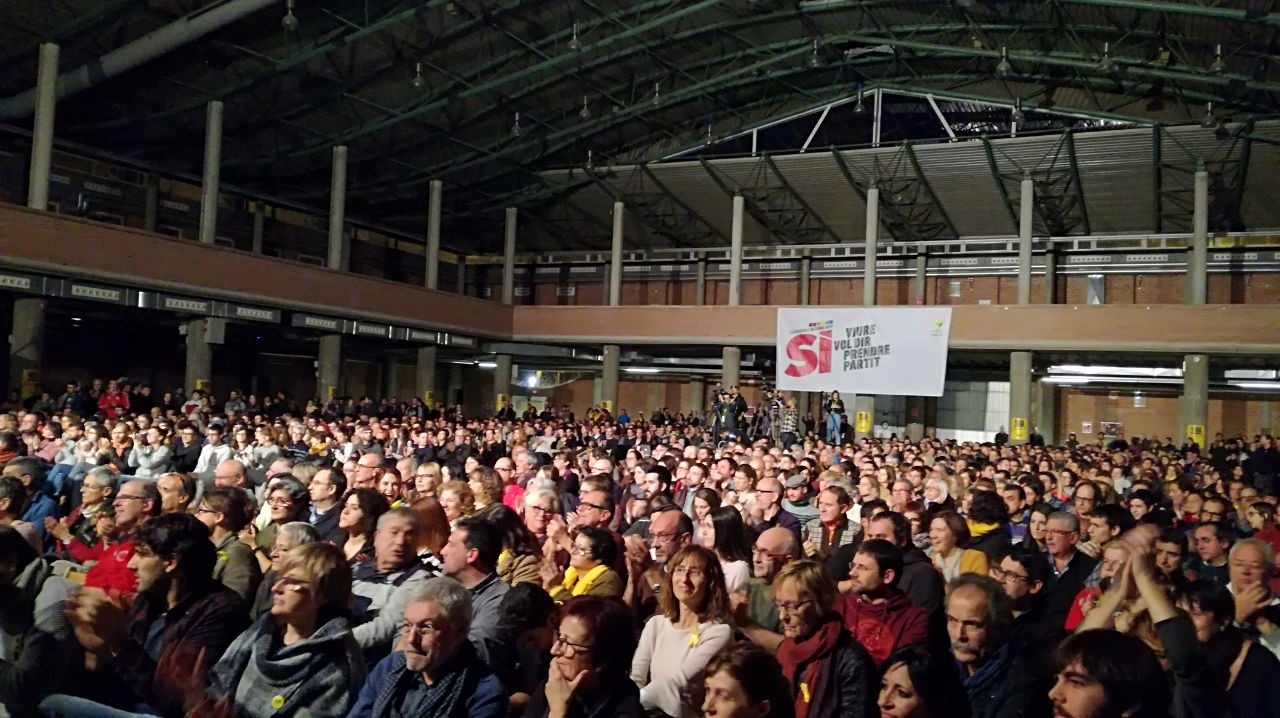 CUP meeting Girona / Image: CUP
CUP meeting Girona / Image: CUP
The ‘Commons’
Finally there is Catalunya en Comú Podem: the joint list of Ada Colau’s organisation, ICV and Podemos in Catalonia. This political alliance is popularly known as ‘the Commons’ (els Comuns). This list is very different from the En Comú Podem, which stood in Catalonia in the two Spanish elections of 2015 and 2016. At that time Podemos was on the rise, attempting to overtake PSOE as the second largest party, and its whole approach and program was much more radical: one of a clear break with the status quo. In those two elections ECP came first in Catalonia, capturing many votes from the CUP and generally appearing to the Catalan people as a party that would defend the right of self-determination in the Spanish parliament.
Podemos came short of overtaking PSOE, which led its leadership to completely change their approach and strategy. The dominant idea was to somehow ‘pull the PSOE towards the progressive camp’, hoping for the PSOE to move a motion of no confidence against the PP and then for Podemos to become a junior partner in a coalition government. That inevitably meant moderating its language and program in order to appear more palatable to PSOE. In Barcelona that saw Ada Colau and Barcelona en Comú reaching a local government alliance with the Socialist Party.
The crisis of the regime around the Catalan independence referendum confirmed that, despite its nice words, the PSOE is firmly wedded to the 1978 regime. Having promised never to accept the use of article 155 against Catalan institutions, PSOE voted for it and supported it publicly and enthusiastically. The leaders of Podemos, instead of realising they had made a mistake, insisted on their utopian strategy. While in the past they talk of “breaking the padlock of the 1978 regime”, now they criticise the PP for “breaking the social pact of 1978”. Their election campaign is cowardly and not credible.
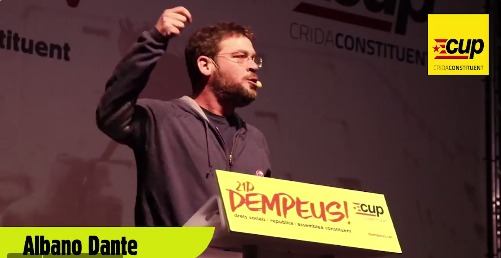 Albano Dante Fachín / Image: CUP
Albano Dante Fachín / Image: CUP
Furthermore the pre-condition for Podemos entering this coalition was for the national leadership to remove the Catalan secretary Albano Dante Fachín. Fachín had clashed with the national leadership in giving full support to the independence referendum and then earned a lot of respect from pro-independence activists for his consistent and principled defence of democratic rights against Spanish state repression. He was finally removed as secretary of Podem (the Catalan organisation of Podemos) in a bureaucratic manoeuvre. This has had a devastating impact on Podem, where dozens of local branches have seen their committees resign en bloc in protest. Fachín and his supporters have set up a new organisation, Som Alternative, but are not standing in the elections. Fachín has participated in rallies in support of ERC and the CUP. He argues that while he is not a supporter of Catalan independence and he has never been, he defends the democratic mandate of the people who fought on 1 October , 3 October and 8 November (the referendum and the two general strikes). He argues, correctly, that regardless of whether you are in favour of a Catalan Republic, a Spanish Federal Republic or a Confederation, none of these can be achieved without a fundamental break with the 1978 regime.
Formally, Catalunya En Comú Podem stands “against both blocks” and for “putting the social agenda at the centre”. In practice, those who fought for the Catalan Republic in the Autumn see them as a party that did not throw its lot behind their democratic struggle and which equates those who used brutal repression against the referendum with those who fought to defend it. Their call to put social issues first rings hollow as their stated strategy to achieve would be a coalition government with ERC and PSC, something that is not only very unlikely, but would also, were it to take place, mean a serious retreat from a genuine left wing program in order to appease the PSC.
After the elections
At the moment it is not clear what the results of the election will be. It is too close to call. If there was a clear victory for the ‘article 155 - constitutional block’ that would be a serious blow against the struggle for a Catalan Republic, but one that would have to be considered against the background of Spanish state repression, curtailment of democratic rights and so on. On the other hand, if there was a victory for the pro-independence block, where the three parties combined would have the necessary 68 seats to get an overall majority in the Catalan parliament, that would be a major blow against the Spanish regime and would put them in a very difficult position.
The formation of any government after such a tight election will be an extremely complex task, probably involving agreements with four parties with contradictory programs. It might not even be possible at all, forcing a repeat election. The deadlock in Catalonia cannot be solved in the polls but rather only by a new wave of the mass movement in the streets. The most important thing is that the CDRs are still active, with dozens and hundreds participating in their regular meetings and actions.
The key now is to strengthen the CUP, push it further along the line of a clear revolutionary, socialist and internationalist program and develop the CDRs around a program of struggle that combines the idea of a Catalan Republic with the opposition to capitalist austerity.

